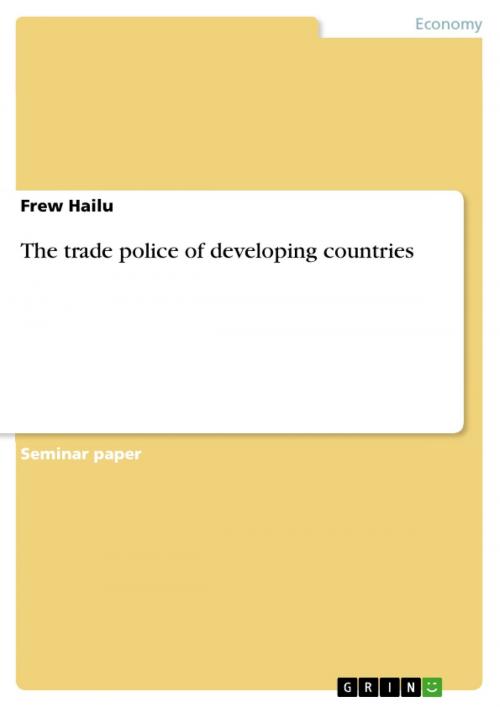| Author: | Frew Hailu | ISBN: | 9783656833758 |
| Publisher: | GRIN Verlag | Publication: | November 7, 2014 |
| Imprint: | GRIN Verlag | Language: | English |
| Author: | Frew Hailu |
| ISBN: | 9783656833758 |
| Publisher: | GRIN Verlag |
| Publication: | November 7, 2014 |
| Imprint: | GRIN Verlag |
| Language: | English |
Seminar paper from the year 2014 in the subject Economics - Other, Wollega University, course: economics, language: English, abstract: The failure of the Seattle ministerial meeting of the World Trade Organization (WTO) to launch a new round of multilateral trade negotiations brings into sharp focus the increasing divide between developed and developing countries in their respective agendas for reforming the international trading environment. The developing countries need a genuine and well-defined agenda for moving the reform process forward. While there is no unanimity among developing countries with regard to the particular items that belong on the agenda, there are common areas of interest that are different from the agenda of the developed countries. This essay attempts to set the background for a new round of multilateral negotiations, though it may take place later than was thought possible on the eve of the Seattle meeting (Rajapatirana, 2000) The 1980s saw nearly all the developing countries reform their trade regimes, improve their economic performance, and provide increased access to exports from developed countries. Many developing countries joined the WTO, and many others are now waiting in the wings to join. The 1990s saw a continuation of the reform trend of the 1980s, despite a few pauses such as the 1994 payments crisis in Mexico and the East Asian crisis that began in 1997. The implementation of the Uruguay Round of multilateral trade negotiations since the mid-1990s gave a definite fillip to trade liberalization in developing countries, as the decade saw the intellectual case for free trade receive new support. But there were also deflections from the mainstream position. New challenges to trade liberalization in developing countries have arisen both from the need to complete the agenda of their domestic reforms and from developments in the international trading environment. [...]
Seminar paper from the year 2014 in the subject Economics - Other, Wollega University, course: economics, language: English, abstract: The failure of the Seattle ministerial meeting of the World Trade Organization (WTO) to launch a new round of multilateral trade negotiations brings into sharp focus the increasing divide between developed and developing countries in their respective agendas for reforming the international trading environment. The developing countries need a genuine and well-defined agenda for moving the reform process forward. While there is no unanimity among developing countries with regard to the particular items that belong on the agenda, there are common areas of interest that are different from the agenda of the developed countries. This essay attempts to set the background for a new round of multilateral negotiations, though it may take place later than was thought possible on the eve of the Seattle meeting (Rajapatirana, 2000) The 1980s saw nearly all the developing countries reform their trade regimes, improve their economic performance, and provide increased access to exports from developed countries. Many developing countries joined the WTO, and many others are now waiting in the wings to join. The 1990s saw a continuation of the reform trend of the 1980s, despite a few pauses such as the 1994 payments crisis in Mexico and the East Asian crisis that began in 1997. The implementation of the Uruguay Round of multilateral trade negotiations since the mid-1990s gave a definite fillip to trade liberalization in developing countries, as the decade saw the intellectual case for free trade receive new support. But there were also deflections from the mainstream position. New challenges to trade liberalization in developing countries have arisen both from the need to complete the agenda of their domestic reforms and from developments in the international trading environment. [...]















